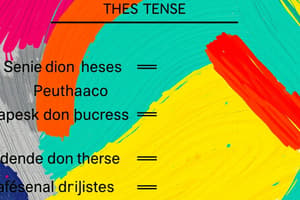Podcast
Questions and Answers
¿Para qué se utiliza principalmente el tiempo condicional en español?
¿Para qué se utiliza principalmente el tiempo condicional en español?
- Para describir acciones completadas en el pasado.
- Para expresar situaciones hipotéticas y acciones que podrían ocurrir bajo condiciones específicas. (correct)
- Para relatar eventos futuros desde una perspectiva presente.
- Para expresar emociones intensas y deseos profundos.
¿Cuál de los siguientes verbos es un ejemplo de verbo irregular en español?
¿Cuál de los siguientes verbos es un ejemplo de verbo irregular en español?
- Tener (correct)
- Comer
- Cantar
- Escribir
¿Cuál es la función principal del tiempo condicional en situaciones hipotéticas?
¿Cuál es la función principal del tiempo condicional en situaciones hipotéticas?
- Describir acciones definitivas.
- Especular sobre eventos futuros bajo condiciones específicas. (correct)
- Expresar deseos y preferencias.
- Narrar eventos pasados de manera cronológica.
¿Qué diferencia el tiempo condicional de otros tiempos verbales en español?
¿Qué diferencia el tiempo condicional de otros tiempos verbales en español?
¿Cuál es una característica distintiva de los verbos irregulares en español?
¿Cuál es una característica distintiva de los verbos irregulares en español?
¿En qué se diferencia el tiempo condicional del pretérito perfecto simple?
¿En qué se diferencia el tiempo condicional del pretérito perfecto simple?
Cmo se forma el tiempo condicional en espaol para los verbos regulares?
Cmo se forma el tiempo condicional en espaol para los verbos regulares?
Cul de los siguientes verbos es un ejemplo de un verbo irregular en el tiempo condicional?
Cul de los siguientes verbos es un ejemplo de un verbo irregular en el tiempo condicional?
Qu diferencia principal existe entre el tiempo condicional y el tiempo futuro simple en espaol?
Qu diferencia principal existe entre el tiempo condicional y el tiempo futuro simple en espaol?
Cul de los siguientes verbos irregulares corresponde al tiempo condicional 'I would have'?
Cul de los siguientes verbos irregulares corresponde al tiempo condicional 'I would have'?
En la formacin del tiempo condicional en espaol, qu hacen los verbos irregulares?
En la formacin del tiempo condicional en espaol, qu hacen los verbos irregulares?
Study Notes
Spanish Conditional Tense
Overview
In Spanish grammar, the conditional tense is used to express hypothetical situations or actions that would occur under certain conditions. It allows speakers to create imaginary scenarios and make polite requests. The conditional tense consists of infinitive verbs with specific endings for each subject pronoun. This guide will explore the formation, usage, and conjugation rules of the Spanish conditional tense, with a focus on irregular verbs, examples, and differences from other tenses.
Formation and Usage
To form the conditional tense in Spanish, use the infinitive form of the verb and add corresponding endings based on the subject pronoun: -ía, -ías, -ía, -íamos, -ían, -ían for singular-plural order, 1st-3rd person. The only exception to this rule are irregular verbs, which have different stem forms and sometimes completely irregular conjugations, such as sería(I would be), tendría(I would have), podría(I could), and habría(I would have).
Conjugation Rules
The conditional tense is formed in the same way as the Spanish future simple tense by starting with the infinitive form of the verb and adding a suffix depending on the subject pronoun. For regular 'ar', 'er', and 'ir' verbs, the conjugations remain the same, but irregular verbs require specific knowledge of their respective forms.
Irregular Verbs
In contrast to regular verbs, irregular verbs do not follow the typical pattern of adding endings based on the subject pronoun. Instead, they have unique stems that must be memorized. Examples include ser (to be), tener (to have), poner (to put), and haber (to be able).
Examples
The conditional tense can be used in various situations, such as expressing hypothetical situations, making polite requests, expressing wishes, preferences, and more. Here are some examples:
Hypothetical Situations
- Si tuviera dinero, voyaría por el mundo. (If I had money, I would travel the world.)
- Si estudiaran más, sacaría mejoras notas. (If they studied more, I would get better grades.)
- Si lloviera, no saldríamos de casa. (If it rained, we wouldn’t leave the house.)
Polite Requests/Offers
- ¿Podría pasarme la sal? (Could you pass me the salt?)
- ¿Me ayudarías con este problema? (Would you help me with this problem?)
- ¿Estarías interesado en acompañarnos al concierto? (Wouldn't you be interested in joining us for the concert?)
Expressing the Future in the Past
In reported speech or narration, the conditional tense is used to express future events from a past perspective, conveying what someone said or thought would happen. For example:
- Dijo que vendría a la fiesta. (He said he would come to the party.)
- Pensé que ganaríamos el partido. (I thought we would win the game.)
- Creíamos que iban de vacaciones. (We believed they were going on vacation.)
Common Expressions
There are several common expressions in Spanish that utilize the conditional tense. These phrases can express wishes, preferences, and more. They add depth and nuance to our conversations. For instance:
- Ojalá que tuviera más tiempo. (If only I had more time.)
Differences from Other Tenses
The Spanish conditional tense is distinct from other tenses due to its focus on hypothetical situations and actions that might occur under specific conditions. Unlike other tenses, it does not describe completed or ongoing actions but rather speculates on potential outcomes. Its unique characteristics allow speakers to express a wide range of thoughts, emotions, and fantasies through their choice of vocabulary and phrasing.
To summarize, the Spanish conditional tense is a versatile tool used to express hypothetical situations, make polite requests, speculate about the past, and convey future events from a past perspective. Its structure and irregularities may require some memorization, but with practice, one can master its usage effectively in various contexts.
Studying That Suits You
Use AI to generate personalized quizzes and flashcards to suit your learning preferences.
Description
Explore the formation, usage, and conjugation rules of the Spanish conditional tense through this comprehensive guide. Learn about irregular verbs, hypothetical situations, polite requests, differences from other tenses, and common expressions. Enhance your understanding of expressing wishes, preferences, and future events in a past perspective.




